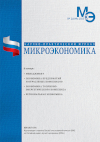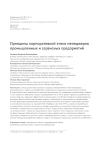Principles of corporate ethics of managers of industrial and service enterprises
DOI: 10.33917/mic-2.109.2023.82-92
The article explores different approaches to the term “sustainability” existing in academic literature and used in practice. It describes three methods – two well-known ones and another one developed by the authors – used for quantitative assessment of the degree of economic and financial sustainability in regions. The regions include four Russian federal subjects in the Russian Arctic and three macroregions that include the aforesaid regions. The indicators used for the assessment are grouped by the following aspects: relevance to national projects, type of assessment scale, internal or external economic factors, and income or spending in a consolidated regional budget. The article explores and draws a distinction between the influence of external factors – indicators of the demographic and natural environments – on the economic sustainability of an area. A comparative analysis is done for three Russian macroregions and four Arctic regions by degree of economic and financial sustainability. The regions and macroregions are ranked based on the results of the comparative analysis using the selected indicators. The ranking helps identify potential strategic vectors and their succession as well as criteria for improvement of economic sustainability in the Russian Arctic.
References:
1. Babkin N., Bespalova S., Senetskaya L., Skotarenko O. Tools for digitalization of economic processes for supporting management decision-making in the Arctic region // IOP Conference Series: Earth and Environmental Science. 2019. Volume 302 Issue 1. 6 August. No 012147.
2. Bykovskaia E., Maiurova A., Kustikova M., Timofeeva I., Tyurikova E. Assessment of the environmental risks in the development of fossil fuels deposits in the Arctic zone of the Russian Federation // IOP Conference Series: Earth and Environmental Science. Volume 723. Issue 5. 12 April 2021.
3. Bulletin of current trends in Russian economy, Retrieved, 2020. URL: https://e-cis.info/upload/iblock/520/520a5eee087274f9007f341e5865b0b3.pdf
4. Kozin M., Plotnikov V., Skotarenko O. Assessment of challenges, threats, and prospects in development of cities and towns in the Arctic zone // IOP Conference Series: Earth and Environmental Science. Volume 302 Issue 1. 6 August No 012103.
5. Concept of Sustainable Development in Countries United Nation Conference on Environment and Development, 1993. New York. Vol. 1-3. URL: https://www.un.org/ru/conferences/environment
6. Towards a Global Pact for the Environment of 10 May 2018: Resolution A / 72 / L.51. URL: https://undocs.org/en/A/RES/72/277
7. National Projects: expectations, results, and prospects. 28.07.2020 Ekspert RA Rating Agency. URL: https://raexpert.ru/researches/national_project_2020/
8. On national development goals in the Russian Federation until 2030: Decree of the President of the Russian Federation of 21 June 2020 No 474. URL: https://www.garant.ru/products/ipo/prime/doc/74304210/
9. On Land Territories in the Arctic Zone of the Russian Federation: Decree of the President of the Russian Federation of 2 May 2016 No. 296 // Collected Laws of the RF 05.05.2014 No18 Part I Art. 2136.



